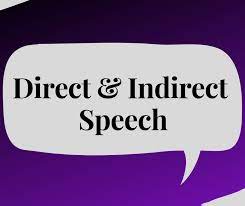Direct And Indirect Speech
In the previous blog, we learned about clauses and their types. In this blog, we are going to learn about Direct and Indirect Speech.
Types of Speech
1) Direct Speech
2) Indirect Speech
Now let's learn about the two types of speeches in detail and practice them to understand better.
1) Direct Speech
a) What is direct speech?
A direct speech is the reporting of the exact or the actual words spoken by someone to another person. A direct speech is reproduced in speech marks (also called quotation marks or inverted commas).
Example:
a) "I am going to the UK tomorrow", said John.
In this case, the words 'I am going to the UK tomorrow' is the direct speech. They are the exact words that are said by John. There is no change in spoken words.
b) Anne yelled, "Rush to the bus."
In this case, the words 'Rush to the bus' is direct speech. They are the exact words that are spoken by Anne. There is no change in the spoken words.
c) Nora whispered, "When is sir going to come for our practical exams?"
In this case, the words 'When is sir going to come for our practical exams?' is the direct speech. These are the exact words that are spoken by Nora. There is no change in the spoken words.
2) Indirect Speech
a) What is Indirect Speech?
An indirect speech is not very different from a direct speech.
Indirect speech gives the same information as direct speech, but unlike direct speech, it does not repeat the same words.
The indirect speech describes the same information in own words.
Indirect speech is not embedded into the quotation marks.
Example:
a) Anvi informed me that she won't be able to attend the conference as she is unwell.
In this case, the sentence is in indirect speech as there are no quotation marks in the speech.
In this sentence, the information is that Anvi has informed that she is unwell so she will not attend the meeting.
The same information can also be given in the direct speech using quotation marks.
But in this case, the word that is used instead of quotation marks to convert the speech into indirect speech.
b) Mona told Priya that she will be joining the party tonight with all others.
In this case, the third person is describing the same thing, what Mona said to Priya but in his/her own words.
Here also, the word that is used to convert the speech to an indirect speech.
Now let's understand the difference between Direct speech and Indirect speech.
Difference between direct and indirect speech
a) Direct speech is written in quotation marks whereas, indirect speech is not written in quotation marks.
b) Direct speech is the exact words while indirect speech is not the exact words (description of the same topic in own words).
c) In indirect speech quotation marks are replaced by the word - that. And also words like - informed, thought are used.
Rules :
2) Indirect speech is never written in inverted commas.
3) Direct speech always uses the exact words.
4) Indirect speech gives the same information in the own words.





Comments
Post a Comment